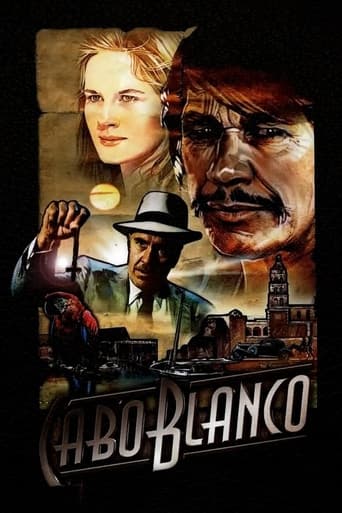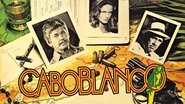Jonathon Dabell
Charles Bronson reteams once more with veteran British director J. Lee-Thompson for a typically violent movie in their usual style. One difference this time round is the unusual period and locale, but away from these slightly-out-of-the-ordinary details the film is very much more of the same from this long-running actor-director partnership.What's going on in the bay off Peruvian seaside town Caboblanco in 1948? The British are busily searching the seabed for something, hiding behind a cock-and-bull story that they're carrying out scientific research. A newcomer in town, the beautiful but mysterious Marie (Dominique Sanda) claims to be an ex-Resistance agent looking for someone she used to know. And on the hill overlooking the bay, Nazi war criminal Beckdorf (Jason Robards) is also desperate to lay his hands on whatever lies lost at the bottom of the ocean. An American fugitive running a seedy bar, Giff Hoyt (Charles Bronson), is concerned by all the strange comings and goings in his town, and decides to investigate further. He discovers that everyone is after a precious cargo which went down with a ship several years earlier; but no-one seems to know exactly where the vessel's final resting place actually is. Or is there someone mixed up in the whole thing who may know more than they're letting on? Plus points include colourful location work, a more-animated-than-usual Bronson performance, a strong supporting cast and a stirring score by Jerry Goldsmith. Negatives include clichés galore, an unclear and sometimes bewildering script, and too many absurdly unnecessary flashes of violence and nudity. One spear-through-the-eyeball moment in particular comes completely out of the blue, and would seem more at home in a gory early 80s slasher pic than a period adventure like this. Having said that, it all builds decently to a rather tense and well-handled final scene at Bronson's bar where our hero and the Robards character endure a final battle of wits. Not perfect by a long shot, but there are plenty worse ways you could while away 100 minutes.
trojans7
A big fan of j lee thompson and charles bronson i found this movie worth a watch. its very layed back and old school like a visit to your folks.its south American local and tropic feel was a real plus and Charley was in in good form.but thompson was slumming it a bit,maybe enjoying the sun to much.the pace was slow even for this sort of film.i think i could of enjoyed it more if the copy i had was any good, but it is poor with only the widescreen formate save it from being unwatchable. it is such a rare movie that i was happy enough to see it at all.if you enjoy 70's style movies and gumshoe movies give it a go its good late night fodder.
jaibo
The third collaboration between star Charles Bronson and veteran British director J Lee Thompson is, like its predecessor The White Buffalo, a strange beast but this time the collaboration doesn't quite manage produce something interesting. An all-star caper set in South America after the close of World War Two, Capo Blanco shows a disparate group of International adventurers going after what turns out to be a hoard of treasure looted by the Nazis during the war. The image of Capo Blanco as a melting pot of various International chancers gives the place in image as well as name a nod to Casablanca. The ex-patriot American protagonist, Giff (Bronson), runs a bar in town just like Rick in the classic and the supporting characters echo figures who once listened to the "You must remember this" refrain – an ultimately good but morally compromised police chief (Fernando Rey doing Claude Rains), a wicked Nazi (Jason Robards for Conrad Veidt) and a mysterious, beautiful woman with Paris in her past (Dominique Sanda standing for Ingrid Bergman). There is an awkwardness to the film, as if Thompson is unsure as to whether this is an homage or a pastiche.Thompson, in his later years especially, was a filmmaker whose world-view was riddled with misanthropy. Here he tries to take what Wilde might have termed a bank holiday from cynicism, as he confesses in a short "Making of" documentary filmed during the shoot, where he identifies the post-war setting as "…an era of romanticism, an age when things seemed to have a drive and excitement of their own, when values were considered to be important and the feeling that the hero in the end should triumph and that you could root for good against bad. We've lost a lot of that, as indeed we should do in the modern cinema. But that is occasionally something which should occasionally appear on the screens when we're making a film today." Cabo Blanco is an exercise in nostalgia but it is exercising muscles in Thompson which had long-since wasted away. For the most part Cabo Blanco a tired film. The story is told without any real effort at audience engagement. Most of the excellent cast are on auto-pilot. Yet this is the logical consequence of its nostalgic romanticism.The denouement, a long and not very well-paced scene in Giff's bar, sees the moral of the film being played out, yet it is as if the figures are animated waxworks re-enacting scenes from a no longer living past. The police chief, who has up until now assisted the Nazi in the search for the treasure, learns that it is loot from "Churches, synagogues, death camps" and so jumps ship, joining the good guys. He regains, in Giff's words, "his soul". The film dramatises a moment when the post-war allies had the moral high ground and where their rectitude could persuade others that they were indeed the good guys. This is a legend now, as the film self-consciously admits in a series of mythologising voice-overs, and Thompson can only repeat it, parrot it. The plot self-consciously involves a parrot's memory. It as if the myth were preserved in aspic, no longer a living thing. The epilogue, over which the voice over tells us that "the legend (…) grew and grew and Cabo Blanco prospered", shows Giff with a swanky house on a hill with the girl, living the good life. A good life built of the legend that he is a good guy.Yet Giff, as his back-story tells us, is a murderer. And as a murderer, he himself is on the run from gas chambers not in Nazi Germany but in the good old USA. Even when making a piece of supposedly romantic nostalgia, Thompson cannot help but let his cynicism seep out.
Pycal
Judging solely from the cool poster art (featuring a mean looking Bronson with a .357 magnum in hand) I expected a gritty 70s/80s style crime flick with the main twist being that it's set in a tropical Latin American location instead of the typical NYC or LA. Instead what we get is a 1940s era neo-noir with shades of 'Casablanca'. I guess I would have been fine with that as it would have been an interesting change of pace for a Bronson flick (so long as it were accompanied by plenty of hard-hitting action). However whatever potential this film had quickly deteriorates as the plot becomes nothing more than a lame, slow paced, sunken treasure movie.Highlights include a few creative(though underwhelming) action scenes, topless Latina chicks, and appearances by Fernando Rey and Jason Robards (who isn't very convincing as a German expatriate). Even a cameo by a talking parrot can't save it. Avoid.







